Your first VCE exams in Year 11 are tough. There’s so much study to do, so little time to do it and you likely haven’t even been shown how to study for exams in the first place.
Nevertheless, it’s important to use these exams as a learning experience for Year 12. Remember, the better you do now, the better you will be placed for getting a great ATAR!
I’ve put together 3 simple tips that will make the mid year exams a little easier, and ways to keep yourself cool, calm and collected!
Tip #1: Write Your Study Notes
Tip #2: Stay Calm
Tip #3: Use Your Study Guide
Tip #1: Write Your Study Notes
Ahhh, study notes. We love them, we hate them. For me, I knew that if I didn’t get on to starting my notes early, I’d be falling behind and struggling to compile them.
What we really should be doing, is compiling constant study notes throughout the year.
Tip: It’s best to constantly work on your study notes and do dot point summaries after every school day on what you’ve covered.
Want a structure for your notes, try go through each dot point of the study design and make notes on them!
Writing your own study notes means that you are processing information and learning content, which will make your memory recall better when you have to study!
I know some people can’t seem to get around to it, or they just don’t understand how to properly write notes and/or study! What I’ve done in the past, is download other people’s study notes.
In doing this, it gives me a completely different perspective on the same content being studied. I believe that it is always good to gain a different idea, as you may understand something in another persons words.
Just work out what is best for you, whether that be writing your own notes, having someone else’s or both – and find your groove!
Behind on your notes? Read our guide to catching up on your notes!
Flashcards
They’re a blessing in disguise! A really good way to quickly cover all the content for your VCE exams.
Compile a set of flashcards for each topic of each subject to accompany your study notes. Take those cards everywhere with you!
Please note that flashcards don’t work for every subject. For example, you’d be better off practicing problems in a subject like maths.
You have no idea how handy they can be in the strangest of places. Waiting at the doctors? Bring out the flashcards. Waiting at the bus station? Bring out the flashcards. At a boring party? Bring out the flashcards!
Flashcards are an extremely handy and easy way to refresh your knowledge.
Some people learn best socially, which is an excellent use for the flashcards. Some people also learn better with pictures and images, so illustrate your flashcards and notes with images that will make you remember the content.
Everybody learns differently, so it’s important that you soon find what best works for you.
Typing notes
Typing your notes can save a lot of time and often be more effective than handwriting notes!
When you’re in class trying to take notes, you won’t even have to worry about how fast your teacher might be going through the content because you’ll be able to type it all down rather than writing it!
Typed notes are also much easier to keep organised and can be constantly edited. You can create a new set of notes per topic but keep them all in one document.
It also gives you the option of printing them out later as you have a digital copy – there’s always the risk of losing your notes if you’ve only got one set of handwritten notes!
Once you print out your notes you can still write over them, highlight them, underline them or whatever works for you to study.
Hand writing notes can be an effective way of understanding complex material, your brain has to think a lot more when hand writing, which helps you learn!
Tip #2: Stay Calm
If you’re a person that completely stresses yourself out over exams, I understand! VCE exams are an extremely stressful time, and make us feel a whole range of emotions.
However, don’t let those emotions consume you! Feel for a little bit, accept it, and move forward. If you begin to let your emotions consume you, you will find yourself stuck in a negative cycle that will be hard to come back from.
Struggling with school? Read about how you can build your confidence for school!
Mid year exams are only a small percentage of your overall grade. So, if you find you didn’t go as well as you had hoped, that doesn’t matter!
Remember, health comes first. Get a good sleep, eat well and exercise. Look after yourself!
You are in control of your study, your homework, your efforts, everything. You control the effort you put into this set of VCE exams.
Tip #3: Use Your Study Guide
For all subjects, exam questions come directly from the study design. You’ll want to be looking at each dot point of the areas of study that will be in your exam. This is the best indicator of what you will need to know and be tested on!
The study design isn’t only useful for study, it’s incredibly useful for ensuring you’re on track and up to date. You can simply tick or highlight a syllabus dot point once you’ve covered it in class.
If you or the teacher start to fall behind in class and you miss a dot point, you’ll notice it if you’re using the study design.
Many of my teachers make us highlight whenever we have completed a dot point, just to make sure we have it covered. Do this yourself during class.
The Bottom Line
Just do your best. These are your first set of proper VCE exams, it’s ok to not do as well as you want on your first go.
It is important to note that mid year exams don’t even contribute to your ATAR, so they can always be used as a learning experience.
If you don’t get the results you want, make sure to reflect on what went well, what didn’t and try work on them for next time. These exams are a great rehearsal for Year 12, so make the most of them!
Are you looking for some extra help with your mid-year exams?
We have an incredible team of tutors and mentors!
We can help you master your study designs by taking you through each dot point of every area of study. We’ll also help you ace your upcoming assessments with personalised lessons conducted one-on-one in your home or online!
We’ve supported over 8,000 students over the last 11 years, and on average our students score mark improvements of over 20%!
To find out more and get started with an inspirational English tutor and mentor, get in touch today or give us a ring on 1300 267 888!
Max Huyton is the VIC Growth Marketer for Art of Smart and a Laws and Commerce student at Monash University. In his other life, Max spends his time reading and writing whenever he gets the chance and cooking extremely mediocre dishes for friends and family.






